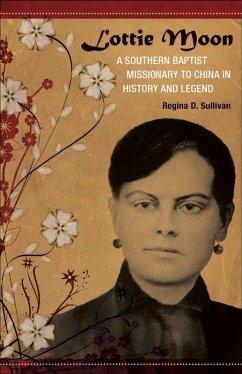Legendary Southern Baptist missionary Charlotte "Lottie" Moon played a pivotal role in revolutionizing southern civil society. Her involvement in the establishment of the Women's Missionary Union provided white Baptist women with an alternate means of gaining and asserting power within the denomination's organizational structure and changed it forever. In Lottie Moon: A Southern Baptist Missionary to China in History and Legend Regina Sullivan provides the first comprehensive portrait of "Lottie," who not only empowered women but also inspired the formation of one of the most influential religious organizations in the United States.
Despite being the daughter of slaveholders in antebellum Virginia, Moon never lived the life of a typical southern belle. Highly educated and influenced by models of independent womanhood, including an older sister who was a woman's rights advocate, an open opponent of slavery, and the first Virginian female to earn a medical degree, Moon followed her sister's lead and utilized her extensive education to successfully combine the language of woman's rights with the egalitarian impulse of evangelical Protestantism.
In 1873 Moon found her true calling, however, in missionary work in China. During her tenure there she recommended that the week before Christmas be designated as a time of giving to foreign missions. In response to her vision, thousands of Southern Baptist women organized local missionary societies to collect funds, and in 1888, the Woman's Missionary Union was founded as the Southern Baptist Convention's female auxiliary for missionary work.
Sullivan credits Moon's role in the establishment of the Woman's Missionary Union as having a significant impact on the erosion of patriarchal power and women's new engagement with the public sphere. Since her initial plea in 1888, the Missionary Union's annual "Lottie Moon Christmas Offering" has raised over a billion dollars to support missionary work.
Lottie Moon captures the influence and culminating effect of one woman's personal, spiritual, and civic calling.
Despite being the daughter of slaveholders in antebellum Virginia, Moon never lived the life of a typical southern belle. Highly educated and influenced by models of independent womanhood, including an older sister who was a woman's rights advocate, an open opponent of slavery, and the first Virginian female to earn a medical degree, Moon followed her sister's lead and utilized her extensive education to successfully combine the language of woman's rights with the egalitarian impulse of evangelical Protestantism.
In 1873 Moon found her true calling, however, in missionary work in China. During her tenure there she recommended that the week before Christmas be designated as a time of giving to foreign missions. In response to her vision, thousands of Southern Baptist women organized local missionary societies to collect funds, and in 1888, the Woman's Missionary Union was founded as the Southern Baptist Convention's female auxiliary for missionary work.
Sullivan credits Moon's role in the establishment of the Woman's Missionary Union as having a significant impact on the erosion of patriarchal power and women's new engagement with the public sphere. Since her initial plea in 1888, the Missionary Union's annual "Lottie Moon Christmas Offering" has raised over a billion dollars to support missionary work.
Lottie Moon captures the influence and culminating effect of one woman's personal, spiritual, and civic calling.
Dieser Download kann aus rechtlichen Gründen nur mit Rechnungsadresse in A, D ausgeliefert werden.









